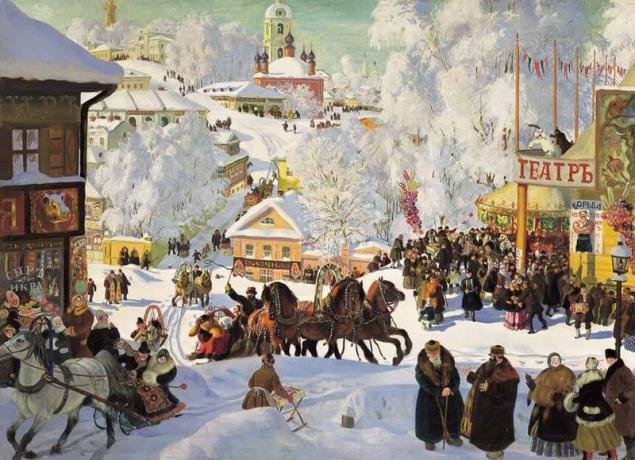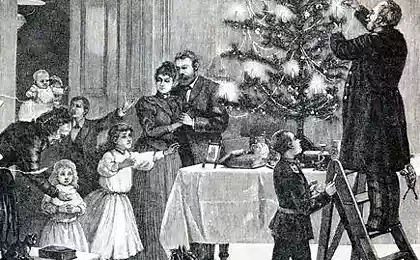526
In the night from 13 to 14 January —Old New Year!
In the night from 13 to 14 January we otmechaem Old New Year - a holiday unknown to many foreigners. No one really can say what is Old New Year is different from the traditional, familiar to all of the New Year? Of course, from the outside it would seem that only in the case of discrepancy of dates. However, we all belong to the Old New Year as a completely independent holiday, we are able to extend the charm of the New year. And, maybe, for the first time to feel it, because the atmosphere is different, but in this day of e holiday more calm, no fuss, so typical of the holiday on 1 January.
There are two reasons for the appearance of unique New Year — change the date to the beginning of New year in Russia and the stubbornness of the Russian Orthodox Church, who did not want to move to a New style.
The story of the Old New YearIn pagan times the New year was celebrated in Russia on March 22 – the vernal equinox, and it was connected with the agricultural cycle. With the adoption of Christianity in Rus the Byzantian calendar gradually began to displace the old, and now New year began on 1 September. For a long time, there remained a disparity, and in some places the New year continued to celebrate in the spring. Only in the late 15th century in Russia officially marked the beginning of the New year – 1 September.
By decree of Peter I in 1699, the New year was moved to 1 January, old style, that is, on January 14, new style. After the revolution in 1918 the Bolsheviks "abolished" 13 more days in the year, which accounted for the difference between our chronology and the European.
The so formed two New year celebrations — new and old style.

©Boris Kustodiev. 1919
The Church is about the Old New Year'sCustom to celebrate Old New Year in the night from 13 to 14 January in Russia is that the Russian Orthodox Church continues to celebrate the New year and Christmas according to the Julian calendar, while differing with the common Gregorian calendar by 13 days. But since March 1, 2100, this difference will be 14 days. With the 2101 Christmas and Old New Year in Russia will be celebrated one day later.
Deputy Chairman Department for external Church relations of the Moscow Patriarchate Archpriest Vsevolod Chaplin said that the Russian Orthodox Church does not intend to make adjustments to your calendar. "Indeed, the difference between the Julian and Gregorian calendars increases by one day every 100 years, when the number of hundreds in the year from the Nativity of Christ is not a multiple of four. And if the Lord allows this world to exist for another 100 years, then the Orthodox will celebrate Christmas on 8 January, and the Old to meet the New Year in the night from 14 to 15," — said Chaplin.
According to him, one should not give much importance to calendar differences. "The Gregorian calendar is not quite accurate, therefore, the Russian Orthodox Church continues to use the Julian calendar," explained Chaplin.
"If it can be found the consent calendar disputes, only after the development of a new, absolutely accurate calendar", — concluded the representative of the Moscow Patriarchate.
For many believers Old New year has a special significance, because from the heart to celebrate it they can only after the end of advent, during the Christmas festivities.
The opinions of scholars about the Old New Year
Old New year — unscientific date, say the astronomers. However, the current calendar is not ideal, experts say the Astronomic-geodetic society of Russia. According to them, the strict mechanics of the movement of the planets causes people to make changes to the calendar. The Julian calendar in force in our country until 1918, 13 days behind the Gregorian, according to which Europe lives. The fact that the Earth revolves around its axis in exactly 24 hours. Additional to this time seconds, gradually together and raced, turn into days. By the early twentieth century, they turned into 13 days, which was the difference between the old Julian and new Gregorian system. New style fit the laws of astronomy.
In the opinion of the Professor of the Department of astrophysics of Moscow state University Edward Kononovich, as long as the calendar accurately reflects the position of the Earth relative to the Sun. Today there are a lot of enthusiasts offering their own version of countdown. Their proposals are mainly related to changes in traditional week: some offer to do a week of five days or do without weeks and to introduce a tenday. However, the ideal of the proposals from the point of view of science, perhaps not — to such conclusion experts of different countries, studying the application for the change of chronology, coming even to the UN. Scientists believe it inappropriate to carry out any reform of the calendar.
The celebration of Old New YearAnd all the same, not paying attention to the fact that this day, unfortunately, is not even weekends, the popularity of Old New Year grows. According to the national center for public opinion research, the number of people willing to celebrate the Old New Year has already exceeded 60%. Among those who is going to celebrate "old" New year – most students, workers, entrepreneurs, Housewives and whole persons younger than 40 years, with special secondary and secondary education, with relatively high incomes.
Traditions on Old New Year
This day in ancient times was called Vasilyeva of the day, and was crucial for the whole year. Vasiliev day celebrated the feast of agriculture, which linked with the future harvest, and performed a rite of Oceania – hence the name of the holiday "ovsen '" or "avsen'". This ceremony was different in different regions of the country: for example, in Tula the children scattered around the house spring wheat, while saying a prayer for rich harvest, and the woman then picked it up and kept until the time of sowing. Ukrainian rites differed with fun, dancing and singing.
And there was a kind of rite – jam cereal. New year's eve, at 2 PM, the eldest of the women had brought cereal from the barn, senior man bringing water from a well or river. Touch the cereals and water as long as the oven is not estupida, it was impossible – they just stood on the table. Then they all sat at the table, and the eldest of the women began to stir the porridge in the pot, uttering at the same time, certain ritual words – groats were usually buckwheat.
Then all rose from the table, and the mess the hostess put in the oven with a bow. The finished cereal was pulled from the furnace and carefully considered. If the pot was just full, and the porridge is thick and crumbly, then you can expect a happy year and a rich harvest – a mess in the morning ate. If the porridge out of the pot, or the pot was cracked – it was not promised to the owners of the house no good, and then were expecting trouble, but the porridge was thrown. This was the program – either to adversity or prosperity, and it is not surprising that it is often realized – after all, believed in it seriously.
Interesting rite of home to taste dishes of pork. On the night of Basil the guests had to feed pork pies, boiled or roasted pig's feet and do any dishes, which include pork. On the table is also always placed a pig's head. The fact that Basil was considered "sinetica" — the patron Saint of pigs and pork products, and believed that if on this night the table would be a lot of pork, these animals will spawn in the farm in abundance, and bring the owners a good profit. This sign is much more positive rite of porridge, especially for the rational and industrious owners. Amazingly sonorous and foldable saying: "Mumps Yes Borovka for Vasiliev dance" also contributed to the mood of the masters in economic prosperity and abundance.
But tradition to sculpt on the Old New year dumplings with surprises appeared not so long ago nobody can remember exactly where and when, however, it is observed with pleasure in many regions of Russia. In some cities, they mold almost every home – with family and friends, and then arrange a cheerful feast and eat these dumplings, looking forward to who and what gets a surprise. This is a funny fortunetelling especially popular with the children. Even at work bring dumplings to cheer friends and co-workers; and local food companies often release these dumplings – it was under the Old New year. published
P. S. And remember, only by changing their consumption — together we change the world! ©
Join us in Facebook , Vkontakte, Odnoklassniki
Source: www.inmoment.ru/holidays/old_new_year.html
There are two reasons for the appearance of unique New Year — change the date to the beginning of New year in Russia and the stubbornness of the Russian Orthodox Church, who did not want to move to a New style.
The story of the Old New YearIn pagan times the New year was celebrated in Russia on March 22 – the vernal equinox, and it was connected with the agricultural cycle. With the adoption of Christianity in Rus the Byzantian calendar gradually began to displace the old, and now New year began on 1 September. For a long time, there remained a disparity, and in some places the New year continued to celebrate in the spring. Only in the late 15th century in Russia officially marked the beginning of the New year – 1 September.
By decree of Peter I in 1699, the New year was moved to 1 January, old style, that is, on January 14, new style. After the revolution in 1918 the Bolsheviks "abolished" 13 more days in the year, which accounted for the difference between our chronology and the European.
The so formed two New year celebrations — new and old style.

©Boris Kustodiev. 1919
The Church is about the Old New Year'sCustom to celebrate Old New Year in the night from 13 to 14 January in Russia is that the Russian Orthodox Church continues to celebrate the New year and Christmas according to the Julian calendar, while differing with the common Gregorian calendar by 13 days. But since March 1, 2100, this difference will be 14 days. With the 2101 Christmas and Old New Year in Russia will be celebrated one day later.
Deputy Chairman Department for external Church relations of the Moscow Patriarchate Archpriest Vsevolod Chaplin said that the Russian Orthodox Church does not intend to make adjustments to your calendar. "Indeed, the difference between the Julian and Gregorian calendars increases by one day every 100 years, when the number of hundreds in the year from the Nativity of Christ is not a multiple of four. And if the Lord allows this world to exist for another 100 years, then the Orthodox will celebrate Christmas on 8 January, and the Old to meet the New Year in the night from 14 to 15," — said Chaplin.
According to him, one should not give much importance to calendar differences. "The Gregorian calendar is not quite accurate, therefore, the Russian Orthodox Church continues to use the Julian calendar," explained Chaplin.
"If it can be found the consent calendar disputes, only after the development of a new, absolutely accurate calendar", — concluded the representative of the Moscow Patriarchate.
For many believers Old New year has a special significance, because from the heart to celebrate it they can only after the end of advent, during the Christmas festivities.
The opinions of scholars about the Old New Year
Old New year — unscientific date, say the astronomers. However, the current calendar is not ideal, experts say the Astronomic-geodetic society of Russia. According to them, the strict mechanics of the movement of the planets causes people to make changes to the calendar. The Julian calendar in force in our country until 1918, 13 days behind the Gregorian, according to which Europe lives. The fact that the Earth revolves around its axis in exactly 24 hours. Additional to this time seconds, gradually together and raced, turn into days. By the early twentieth century, they turned into 13 days, which was the difference between the old Julian and new Gregorian system. New style fit the laws of astronomy.
In the opinion of the Professor of the Department of astrophysics of Moscow state University Edward Kononovich, as long as the calendar accurately reflects the position of the Earth relative to the Sun. Today there are a lot of enthusiasts offering their own version of countdown. Their proposals are mainly related to changes in traditional week: some offer to do a week of five days or do without weeks and to introduce a tenday. However, the ideal of the proposals from the point of view of science, perhaps not — to such conclusion experts of different countries, studying the application for the change of chronology, coming even to the UN. Scientists believe it inappropriate to carry out any reform of the calendar.
The celebration of Old New YearAnd all the same, not paying attention to the fact that this day, unfortunately, is not even weekends, the popularity of Old New Year grows. According to the national center for public opinion research, the number of people willing to celebrate the Old New Year has already exceeded 60%. Among those who is going to celebrate "old" New year – most students, workers, entrepreneurs, Housewives and whole persons younger than 40 years, with special secondary and secondary education, with relatively high incomes.
Traditions on Old New Year
This day in ancient times was called Vasilyeva of the day, and was crucial for the whole year. Vasiliev day celebrated the feast of agriculture, which linked with the future harvest, and performed a rite of Oceania – hence the name of the holiday "ovsen '" or "avsen'". This ceremony was different in different regions of the country: for example, in Tula the children scattered around the house spring wheat, while saying a prayer for rich harvest, and the woman then picked it up and kept until the time of sowing. Ukrainian rites differed with fun, dancing and singing.
And there was a kind of rite – jam cereal. New year's eve, at 2 PM, the eldest of the women had brought cereal from the barn, senior man bringing water from a well or river. Touch the cereals and water as long as the oven is not estupida, it was impossible – they just stood on the table. Then they all sat at the table, and the eldest of the women began to stir the porridge in the pot, uttering at the same time, certain ritual words – groats were usually buckwheat.
Then all rose from the table, and the mess the hostess put in the oven with a bow. The finished cereal was pulled from the furnace and carefully considered. If the pot was just full, and the porridge is thick and crumbly, then you can expect a happy year and a rich harvest – a mess in the morning ate. If the porridge out of the pot, or the pot was cracked – it was not promised to the owners of the house no good, and then were expecting trouble, but the porridge was thrown. This was the program – either to adversity or prosperity, and it is not surprising that it is often realized – after all, believed in it seriously.
Interesting rite of home to taste dishes of pork. On the night of Basil the guests had to feed pork pies, boiled or roasted pig's feet and do any dishes, which include pork. On the table is also always placed a pig's head. The fact that Basil was considered "sinetica" — the patron Saint of pigs and pork products, and believed that if on this night the table would be a lot of pork, these animals will spawn in the farm in abundance, and bring the owners a good profit. This sign is much more positive rite of porridge, especially for the rational and industrious owners. Amazingly sonorous and foldable saying: "Mumps Yes Borovka for Vasiliev dance" also contributed to the mood of the masters in economic prosperity and abundance.
But tradition to sculpt on the Old New year dumplings with surprises appeared not so long ago nobody can remember exactly where and when, however, it is observed with pleasure in many regions of Russia. In some cities, they mold almost every home – with family and friends, and then arrange a cheerful feast and eat these dumplings, looking forward to who and what gets a surprise. This is a funny fortunetelling especially popular with the children. Even at work bring dumplings to cheer friends and co-workers; and local food companies often release these dumplings – it was under the Old New year. published
P. S. And remember, only by changing their consumption — together we change the world! ©
Join us in Facebook , Vkontakte, Odnoklassniki
Source: www.inmoment.ru/holidays/old_new_year.html























